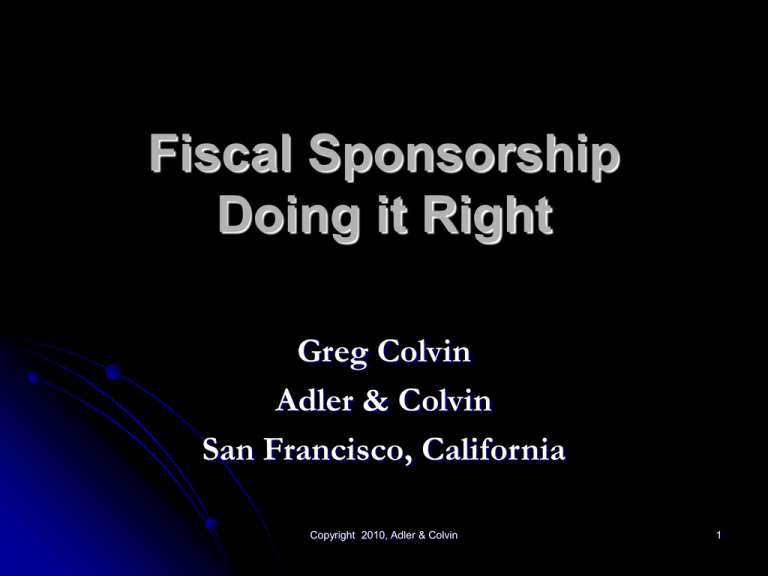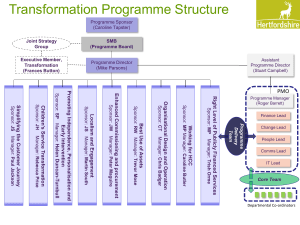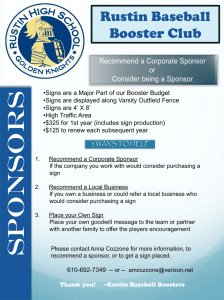The IRS Audit – How to Prepare NOW
advertisement

Fiscal Sponsorship Doing it Right Greg Colvin Adler & Colvin San Francisco, California Copyright 2010, Adler & Colvin 1 What is Fiscal Sponsorship? An arrangement between a 501(c)(3) public charity and a project in which, typically, the charity receives and expends funds to advance the project while retaining discretion and control over the funds. Copyright 2010, Adler & Colvin 2 Not Fiscal Agency Fiscal Agency – Wrong Term charity is not agent to receive project $ Fiscal Sponsorship – Preferred Term charity directs, controls project $ Copyright 2010, Adler & Colvin 3 Two Main Ways to Do It Right Direct Project Model (A) * Independent Contractor is Model B Pre-Approved Grant Model (C) Copyright 2010, Adler & Colvin 4 Copyright 2010, Adler & Colvin 5 Copyright 2010, Adler & Colvin 6 Direct Project, Model A 1. 2. 3. 4. Project belongs to sponsor Project is not a separate legal entity Project personnel are employees / volunteers Contributions belong to sponsor Copyright 2010, Adler & Colvin 7 Direct Project, Model A 5. 6. 7. 8. Sponsor is liable for everything Sponsor reports revenue and expenses Sponsor OWNS project Project may have advisory committee Copyright 2010, Adler & Colvin 8 Legal Steps Project director or advisory committee establishes a contract with sponsor. Sponsor’s board has already approved a sponsorship program or approves now. Fundraising done in name of sponsor. Sponsor receives grants, donations into project fund account, pays costs directly. Copyright 2010, Adler & Colvin 9 Pre-Approved Grant, Model C 1. 2. 3. 4. Project belongs to grantee Project is in a separate legal entity Project personnel work for grantee Charitable contributions go to sponsor first Copyright 2010, Adler & Colvin 10 Pre-Approved Grant, Model C 5. 6. 7. 8. Grantee is liable for project Sponsor reports contributions in and grants out Grantee reports grant in and expenses out Sponsor retains “variance power” (discretion and control) over funds Copyright 2010, Adler & Colvin 11 Pre-Approved Grant – 7 Steps 1. 2. 3. 4. 5. 6. 7. Written grant proposal from project Sponsor evaluation of proposal Sponsor Board approval Written grant agreement Proper solicitation of funds Proper accounting for funds Reports from grantee to sponsor Copyright 2010, Adler & Colvin 12 Copyright 2010, Adler & Colvin 13 How Could Anything Go Wrong? Copyright 2010, Adler & Colvin 14 Problems Common to Both Models 1. Sponsor is “absent,” or “We are just using their 501(c)(3)” 2. 3. 4. 5. No written agreement Confusion with DAF or other programs Sponsor mischaracterizes relationship Donor confusion about recipient Copyright 2010, Adler & Colvin 15 Direct Project Problems 1. 2. Sponsor fails to plan for liability No pre-nuptial agreement 3. 4. 5. 6. Dealing with the break-up Ownership of intellectual property Project spends more than it has Organizing an advisory committee Treatment of employees Copyright 2010, Adler & Colvin 16 Pre-Approved Grant Problems 1. 2. 3. 4. 5. 6. Failure to pre-approve the grant relationship Grantee fails to report income Ownership of intellectual property Grantee fails to report back to sponsor Sponsor pays grantee’s bills directly Lack of professional grants management Copyright 2010, Adler & Colvin 17 Resources Fiscal Sponsorship: 6 Ways To Do It Right, 2005 edition www.fiscalsponsorship.com www.fiscalsponsordirectory.org National Network of Fiscal Sponsors: www.tides.org/community/networkspartners/nnfs/ Copyright 2010, Adler & Colvin 18







